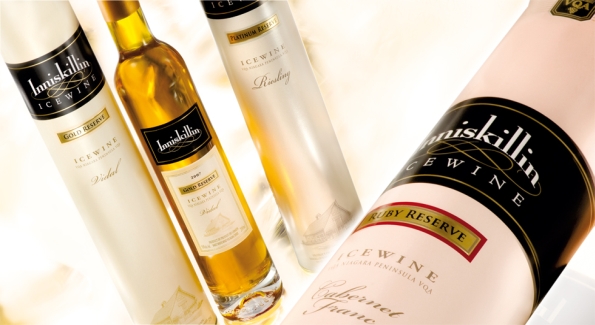Our neighbors to the north make some killer juice, including rare, rich icewine and dry, food friendly Rieslings.
By Kelly A. Magyarics
U.S. Winter Olympians in Vancouver are finding themselves on the podium way more often than in previous games. The amount of bling that our American athletes are sporting is enough in itself to raise a glass in recognition and celebration. But what to toast with? Luckily the host country produces some gold-medal caliber wines available in DC restaurants and shops.
Icewine, in the strict, traditional sense of the word, is just what it sounds like: grapes are allowed to freeze on the vine before being picked late at night when they are coldest. The water in the berries is trapped as ice, and what remains is a very tiny amount of sweet juice that doesn’t freeze.
It’s from this pure, elegant liquid that icewine is made. (Germany is also known for producing elegant, expensive icewines, but keep in mind that other wineries like California’s Bonny Doon make what’s referred to as Vin de Glacière or “freezer wine” by taking grapes from the vine and sticking them into the freezer. The resultant wine is tasty, but technically not authentic. Though budget conscious oenophiles will note that freezer wine does cost a fraction of the price.)
You can find Canadian icewine at Café Atlantico, which carries Inniskillin, undoubtedly the most famous and easily recognized producer. The Cabernet Franc-based wine is 8 for a 375 mL bottle.
(Since icewine is richer and higher in alcohol than regular table wine, you can thankfully get more servings from a bottle than you think.
) Beverage Director Jill Zimorski asked the producer why they used that varietal (which happens to be one of her favorites,) and was told that since Cabernet Franc does well on the East Coast of the United States and in North America in general, it seemed like a natural choice. “The result is a deep ruby, sweet wine that is like cranberry nectar,” Zimorski says.
“It’s so different and so good.” Inniskillin also makes icewine from Vidal and from Riesling.
What I personally like about icewine, as opposed to other dessert wines, is the clean, pure expression of the fruit. It doesn’t rely on Botrytis, the “noble rot” that robs the grape of water, dehydrating it and leaving concentrated juice, like wines such as Sauternes do. So while icewine doesn’t have those funky aromas and flavors that you can sometimes pick out in Botrytized wines that are appealing to many wine lovers, what it does have is lots of true, luscious fruit flavor. And though it’s undeniable that these wines are sweet, they have a great line of acidity running through them that keeps them from being like that other popular Canadian product, maple syrup, which is great on your pancakes, not so much in your glass.
(If you tend to shy away from dessert wines because they just are too unctuously sweet, maybe you just haven’t yet found the right bottle. The best dessert wines at any price point are both sweet and crisp, and call you back for another sip.)
But if sweet’s really not your thing, or you’re looking for other options, opt for Canada Dry–dry Riesling, that is, especially those from the Niagara Peninsula. Bourbon Steak sells the 2006 Cave Springs Dry Riesling for $50 a bottle, and Head Sommelier Brick Loomis describes it as a dry, Alsatian-style wine that’s close in style to a Trimbach or a Zindhumbrecht. He cites it as a fantastic wine with Bourbon Steak’s shellfish platter, with sashimi, or even charcuterie.
I’d add that it would be fantastic with Asian food, as well as pork dishes. Over at Tallula in Arlington, Wine Director Juliana Santos also carries the Cave Springs Riesling, but the 2007 vintage. She points out that they have several Canadian wines on sales at Planet Wine, so when the Olympics are over, stop in to pick up a few bottles and keep the celebration going. Though Canadian wines aren’t altogether easy to find in the DC area, they are no doubt easier to spot than getting your hands on those super cute maple leaf Olympic mittens that are sold out everywhere…
Kelly Magyarics is a wine and spirits writer, and wine educator, in the Washington, DC area. She can be reached through her website, www.kellymagyarics.com, or at www.twitter.com/kmagyarics.

